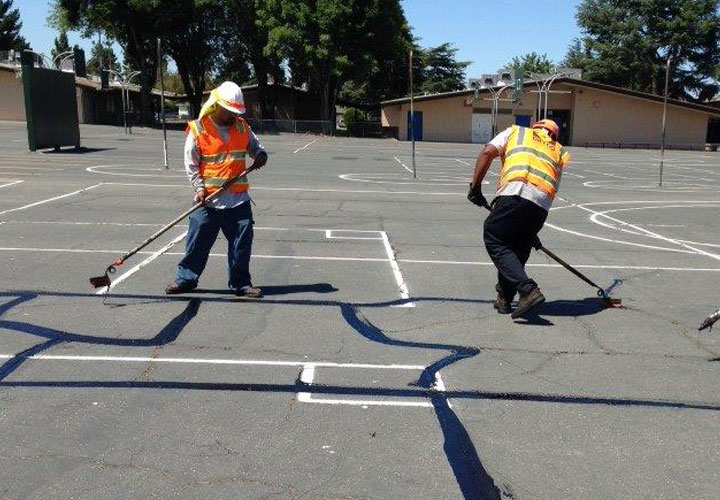Secure Surface Areas with Professional Asphalt Sealing: Cold Mix Basics
Wiki Article
Cold Mix Asphalt Vs. Hot Mix Asphalt: Which Is Right for You?

Composition Distinctions
Cold mix asphalt is created by emulsifying the asphalt binder with water and an emulsifying agent prior to blending it with accumulation. The hot mix asphalt production process entails warming the aggregate and asphalt binder separately prior to incorporating them at the asphalt plant.
Furthermore, chilly mix asphalt has a tendency to be much less dense and extra adaptable than warm mix asphalt. This flexibility makes it much better matched for locations with greater levels of movement, such as driveways or roads with heavy website traffic. In contrast, hot mix asphalt is understood for its high longevity and resistance to rutting and splitting, making it a preferred selection for highways and high-traffic roadways where long life is vital.
Installation Process Differences
The procedure of mounting cold mix and warm mix asphalt shows noteworthy variances in their treatments and requirements. In comparison, warm mix asphalt requires an extra intricate installation procedure. Due to the heating requirements, warm mix asphalt setups are commonly carried out by experts with customized tools, guaranteeing a more structurally audio and irreversible outcome.Toughness and Longevity Aspects
When taking into consideration asphalt choices, longevity and long life are important elements to assess for enduring pavement efficiency. Warm mix asphalt (HMA) is known for its exceptional resilience and longevity.
In regards to longevity, HMA generally exceeds CMA due to its exceptional toughness and resistance residential properties. HMA sidewalks have a longer life span, calling for much less frequent repair work and upkeep, which can translate to cost savings over time. Additionally, HMA sidewalks are a lot more quickly adjustable to meet details job needs, even more boosting their toughness.
Cost Factors To Consider
Taking into consideration the economic ramifications is a crucial element when evaluating the option between hot mix asphalt (HMA) and cold mix asphalt (CMA) for pavement check out here jobs. While the preliminary price of hot mix asphalt is normally higher than that of chilly mix asphalt, HMA commonly provides a much more economical solution in the long run due to its exceptional durability and long life.Along with product prices, it's necessary to consider the expenses associated with installment and upkeep when comparing HMA and CMA. HMA usually calls for specific tools and skilled labor for proper setup, which can impact overall job prices. Alternatively, CMA is easier to collaborate with and can usually be applied making use of easier click here to find out more methods, potentially decreasing installation expenses. Ultimately, the decision in between HMA and CMA must take into consideration not simply the first cost however also the lasting financial implications to establish the most affordable choice for the certain sidewalk task.
Environmental Impact Contrast
Comparison of the environmental influences in between hot mix asphalt (HMA) and cool mix asphalt (CMA) exposes distinctive distinctions in sustainability practices. HMA manufacturing requires high temperature levels, leading to raised power intake and greenhouse gas discharges.Moreover, making use of CMA commonly involves recycling existing asphalt pavement, advertising source conservation and lowering the amount of waste sent to land fills. This reusing element additionally improves the sustainability of CMA contrasted to HMA. In general, when considering the ecological impact, CMA arises as an extra environmentally sustainable selection because of its lower energy requirements, minimized Get More Info exhausts, and the potential for recycling existing materials. By opting for CMA over HMA, road building jobs can add favorably to ecological preservation efforts.
Verdict
To conclude, the option in between cold mix asphalt (CMA) and hot mix asphalt (HMA) depends on various factors such as make-up, setup process, durability, durability, price, and environmental impact. asphalt patch repair. While CMA uses a quick and cost-efficient solution for minor repair services, HMA ensures remarkable longevity and durability for heavy website traffic areas. Consider these variables meticulously to figure out which sort of asphalt is the right option for your paving needs

Considering the monetary effects is a vital facet when reviewing the option in between hot mix asphalt (HMA) and chilly mix asphalt (CMA) for sidewalk tasks. While the initial expense of warm mix asphalt is generally greater than that of cool mix asphalt, HMA frequently supplies an extra cost-effective service in the lengthy run due to its premium resilience and durability. asphalt repair.Contrast of the environmental impacts between hot mix asphalt (HMA) and chilly mix asphalt (CMA) exposes unique distinctions in sustainability techniques.In verdict, the selection between cold mix asphalt (CMA) and hot mix asphalt (HMA) depends on various elements such as structure, setup procedure, longevity, long life, price, and ecological influence
Report this wiki page